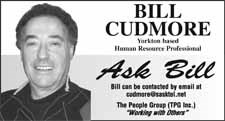Last week we discussed empowering people and I listed, COACHING, as one approach that will accomplish that goal. As previously mentioned, we think of coaching as only sports related. Other types of coaching include, but are not limited to the following: Career, Personal/life, Business, Executive, Performance and Team Facilitation. My interest in coaching started with sports, receiving approximately 80 hours of on and off ice training conducted by the Saskatchewan Amateur Hockey Association (SAHA). Since then I have completed a two day coaching course with the International Coach Federation (ICF) and six months at Royal Roads University in Victoria graduating as a Certified Executive Coach (CEC). Continuing my education I am licensed to conduct a "Coaching out of the box" program that is applicable to both our professional and personal lives.
What interested me in developing this skill was that, partnering with a coach creates a designed alliance that supports an individual in all aspects of life-not just in sports or work. By supporting individuals and organizations to maximize their potential, coaching brings out the best... in performance, communication, relationships, team building and daily conversations.
What is so different today in our business and personal life that requires unique support? The Case for Coaching:
The demands on us are increasing, both personally and professionally. WE have to do more with less at work and more than likely at home as well. Our pace is faster than it has ever been. Our learning curves are steeper in every part of our lives because of technology and competition. Doing the same thing (status quo) is not enough anymore. Out of all this, where is the balance? Sustainability of a quality of life and the ability to maximize potential in both our personal and professional lives is important.
Our personal lives are more and more demanding. Whether we are an employee of an organization, own a small business, or raising a family, the challenges we face in our world today can be overwhelming.
In the business world, leading and managing people today, more than ever, is about developing and maximizing the most precious resource... human resources. Today's managers and leaders are charged with maximizing their own performance as well as those who work with them. The ability to get people to maximize their potential often depends on how well they are coached to reach their peak performance.In Summary, getting the support required to sort out the challenges in our professional and personal life isn't always easy.
Who really listens? Who really cares? BUT:Coaching, as a tool supports people, executives and businesses to find solutions, take action and move forward. It is a collaborative relationship that enables people and organizations to be their best and do their best. Coaching includes simple guiding principles, and skills needed to use the tool. Coaching works because the principles, steps and skills transcends the segments of our lives and works equally as well in the personal arena as in the business arena.
Very simply, by developing very basic coaching skills, people can deal more creatively and effectively with business or personally challenges that arise. Inviting coaching into your lives and organizations makes your communication tool kit more robust, giving your practical skills and processes to use that will make a difference.
When you learn and integrate coaching skills into how you work and live your life - there are some key things that can happen. You: Define individual strengths and natural talent.
Create a better balance between work and life.
Clarify, set goals and strategies to achieve them.
Overcome limited thinking and perceive barriers to success.
Improve time management and reduce stress
Discover and integrate leadership skills. AND
Develop communication skills such as listening, giving and receiving feedback.
Does the above mean that everyone should be a certified coach to succeed? The answer is no. What it does mean is that we can all increase our levels of daily communication by sharpening our coaching skills.
Next week I will discuss the core coaching skills and principles.
Send your comments and questions to [email protected] or [email protected] all mail will be kept confidential.




